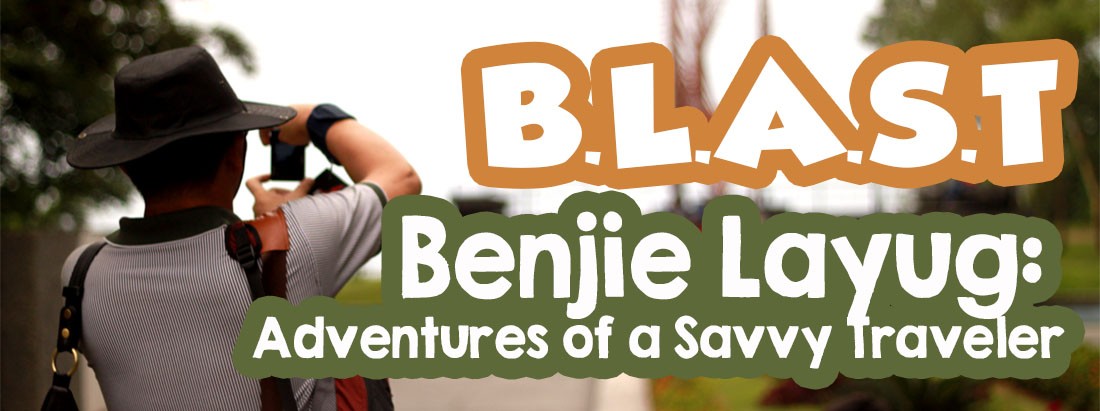After our Lakbay Norte 2 visit to Tam-awan Village in Pinsao Proper in Baguio City, we all returned to our bus and proceeded to Asin Rd. in Tuba, 6 kms. from the city, to visit a prominent Filipino artist who has taken up permanent residence in the Philippines’ “Summer Capital.”
The city, whose lovely natural environment and the rich Cordillera cultural heritage has inspired creativity, has become a natural haven for artists and now home to a growing number of gallery cafes and exhibits that showcase the paintings and sculptures of groups of local as well as visiting artists.
He is one of many who shared a passion for indigenous art, injecting local elements and techniques in their works, and dedicated to nurturing and preserving Cordilleran culture. That man is painter, printmaker and 2006 National Artist for the Visual Arts Benedicto R. Cabrera, more popularly known as BenCab.
He’s not named Benjamin as mentioned in other write ups though I wish he had the same first name as me. He, together with popular local artists such as solar artist Jordan Mang-osan, mixed-media painter John Frank Sabado and self-taught artist Ged Alangui set up the Chanum Foundation.
Chanum which, in Ibaloi, means “water,” was the name adopted to symbolize its vision and role to be as nurturing and life-giving as a spring in the once vast pastureland of Pinsao.
After passing a woodcarver’s village with rows of shops selling a fabulous collection of carved figures, in varying sizes, ranging from giant statues to “stickmen,” we arrived at the ultra-modern BenCab Museum, built on a promontory.
Here, we were welcomed by BenCab himself. A Baguio resident for a quarter of century now, Bencab set up this permanent home for his art as well as his personal collection of the works of other acknowledged Filipino masters and rising contemporary artists and his collection of Cordillera artifacts. After the interview, we explored the different areas of the museum.
The BenCab Gallery features the artist’s own works over a continuing artistic career that spans more than four decades.
The Cordillera Gallery is the repository of BenCab ’s collection of Cordilleran tribal artifacts and indigenous crafts such as bulols (rice granary gods); functional carved objects such as furniture, spoons, bowls and other utilitarian implements such baskets; and tribal weapons.
The Philippine Contemporary Art Galleries (1 and 2) houses the artist’s collection of paintings, drawings, prints and sculpture accumulated by BenCab through the years.
The Maestro Gallery houses a selection of works acknowledged masters of Philippine art such as Lee Aguinaldo, Roberto Chabet, Victorio C. Edades, Jose Joya, Cesar Legaspi, Arturo Luz, Anita Magsaysay-Ho, Juvenal Sanso, Fernando Zobel and others.
The Erotica Gallery houses paintings, drawings, sculpture and other artworks by various artists with an erotic subject or theme. The Print Gallery exhibits vintage maps, prints, photographs and postcards on the Philippines as well as contemporary prints and photographs.
The tall Sepia Gallery, adjoining the museum shop (which sells art books, paper products such as postcards, and notepads, highland art & crafts such as wood carvings and textiles as well as other souvenir items from t-shirts, and caps), is a venue for changing exhibitions.
Patio Salvador, an open terrace adjoining the Indigo Gallery, is used for receptions and sculpture shows while the Larawan Hall serves as a function room for art workshops, meetings, seminars, art film showings, and other related activities.
Prior to leaving, we enjoyed a merienda of clubhouse sandwiches and pasta dishes at Cafe Sabel, the museum’s coffee shop which overlooks the hill beyond and the mini-forest and duck pond below the museum.
Also below the museum is the farm and garden which showcases organic farm produce (seasonal vegetables, herbs, strawberries, sweet potatoes, coffee and ornamentals) and the typical Ifugao, Kalinga and Bontoc indigenous architecture.
A river, which meanders through the property, has cascading waterfalls on one end. There is an aviary housing peacocks and various birds,plus ducks, geese, turkeys and other local livestock.
BenCab Museum: Km. 6, Asin Rd., Tadiangan, Tuba, Benguet. Tel: (074) 442-7165. Mobile: (0920) 530-1954. E-mail: bencabartfoundation@gmail.com. Website: www.bencabmuseum.org. Open Tuesdays to Sundays, 9 AM-6 PM. General Admission: PhP100. Students and Senior Citizens (with valid ID): PhP80.

















